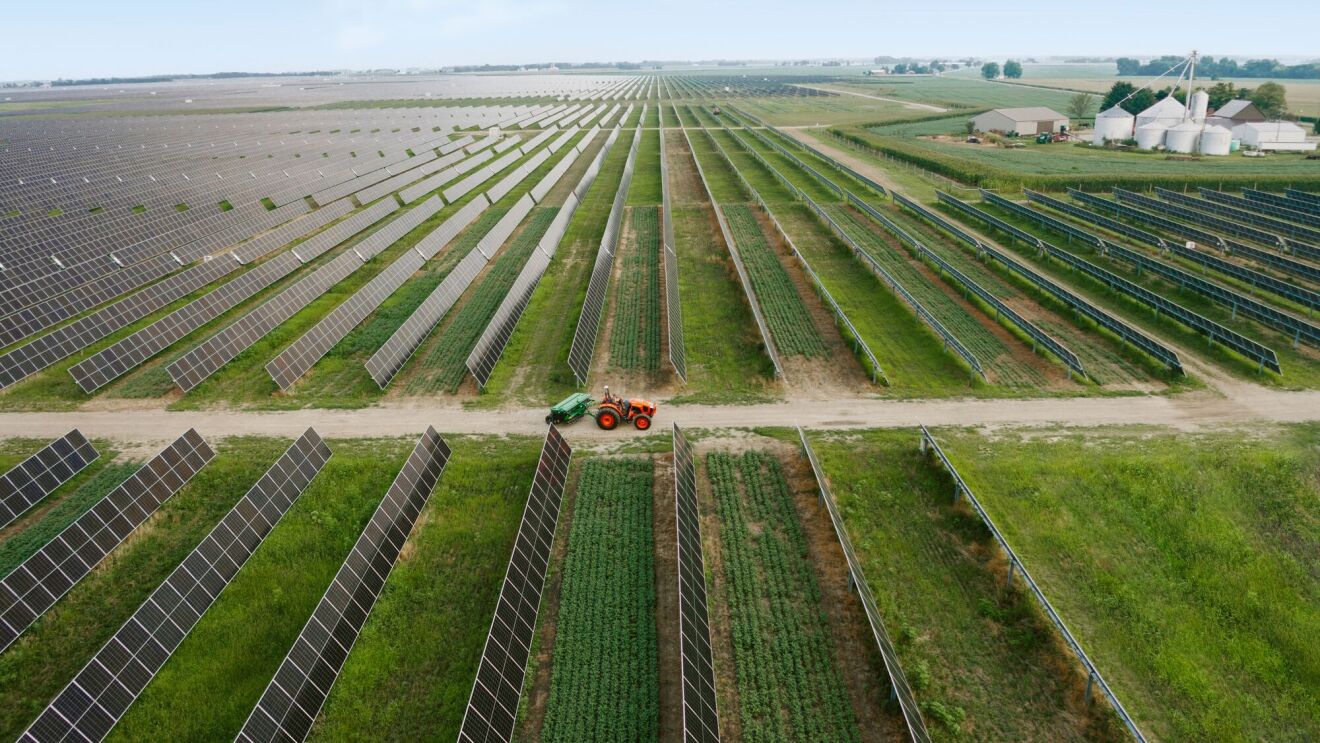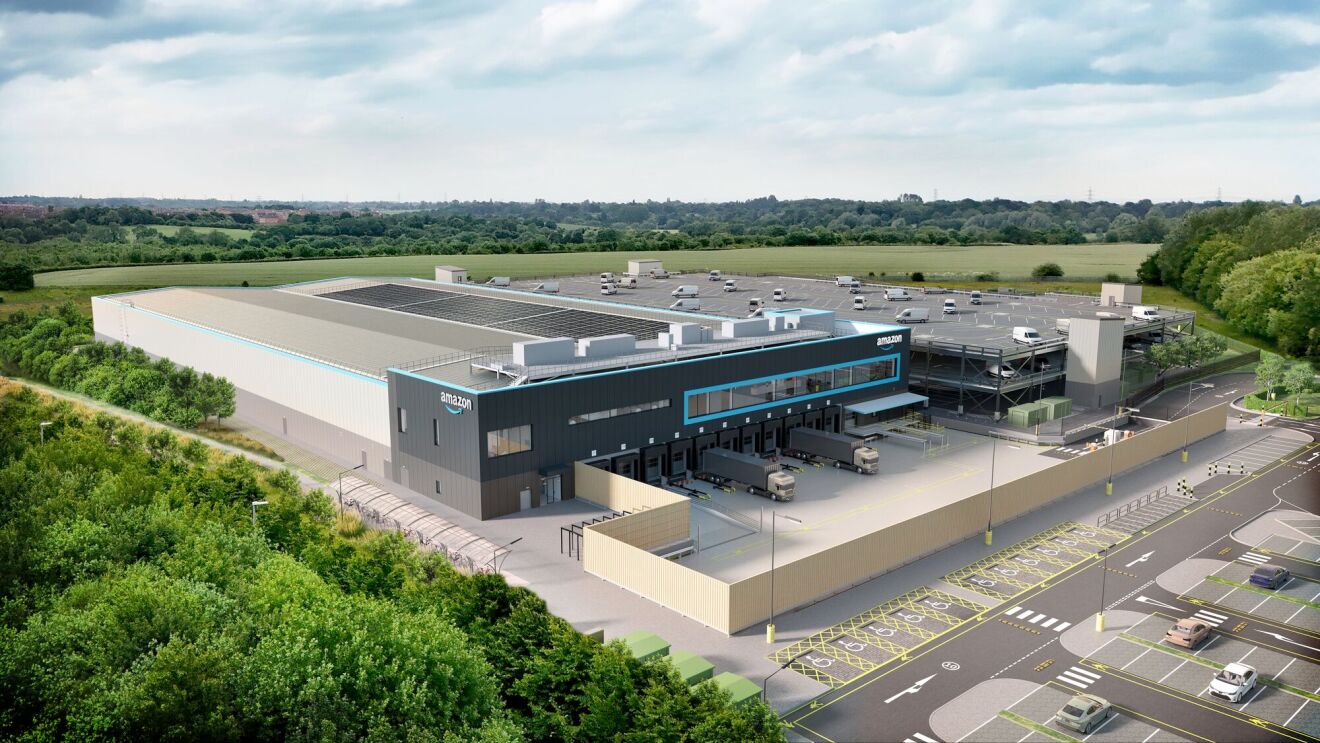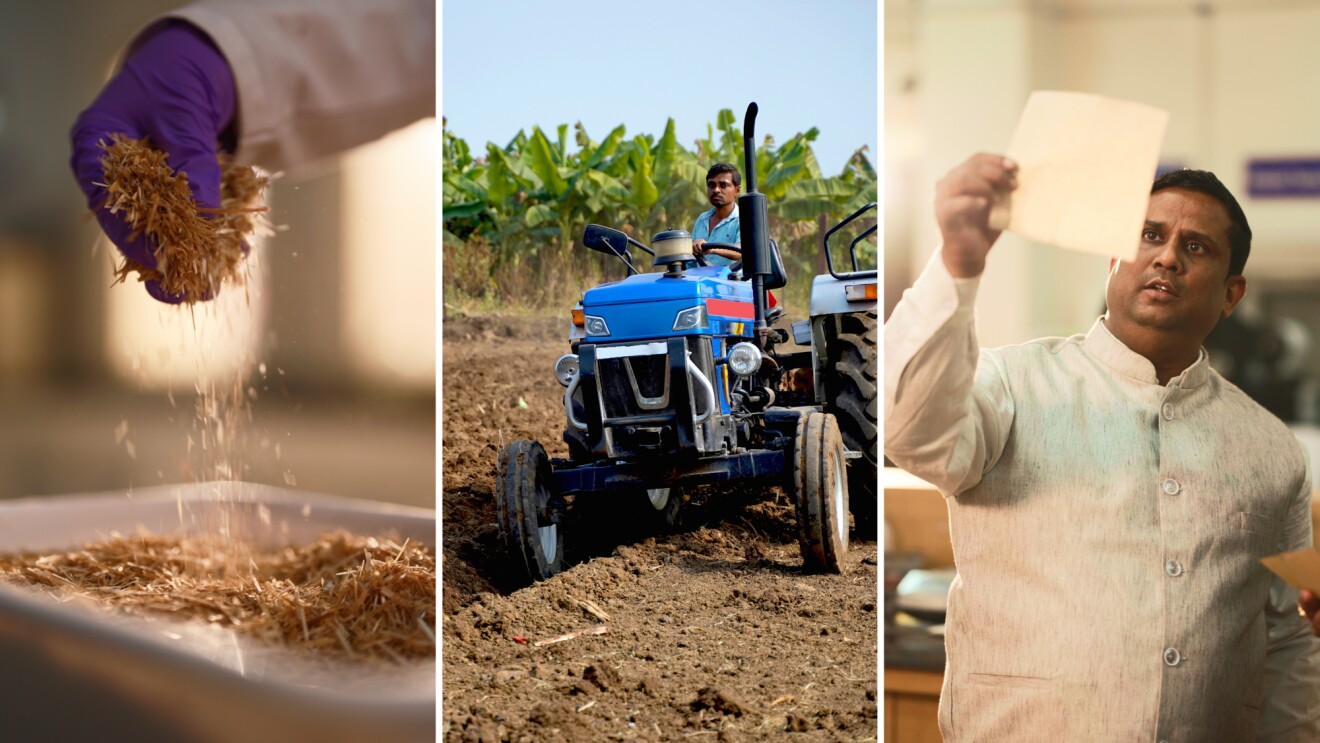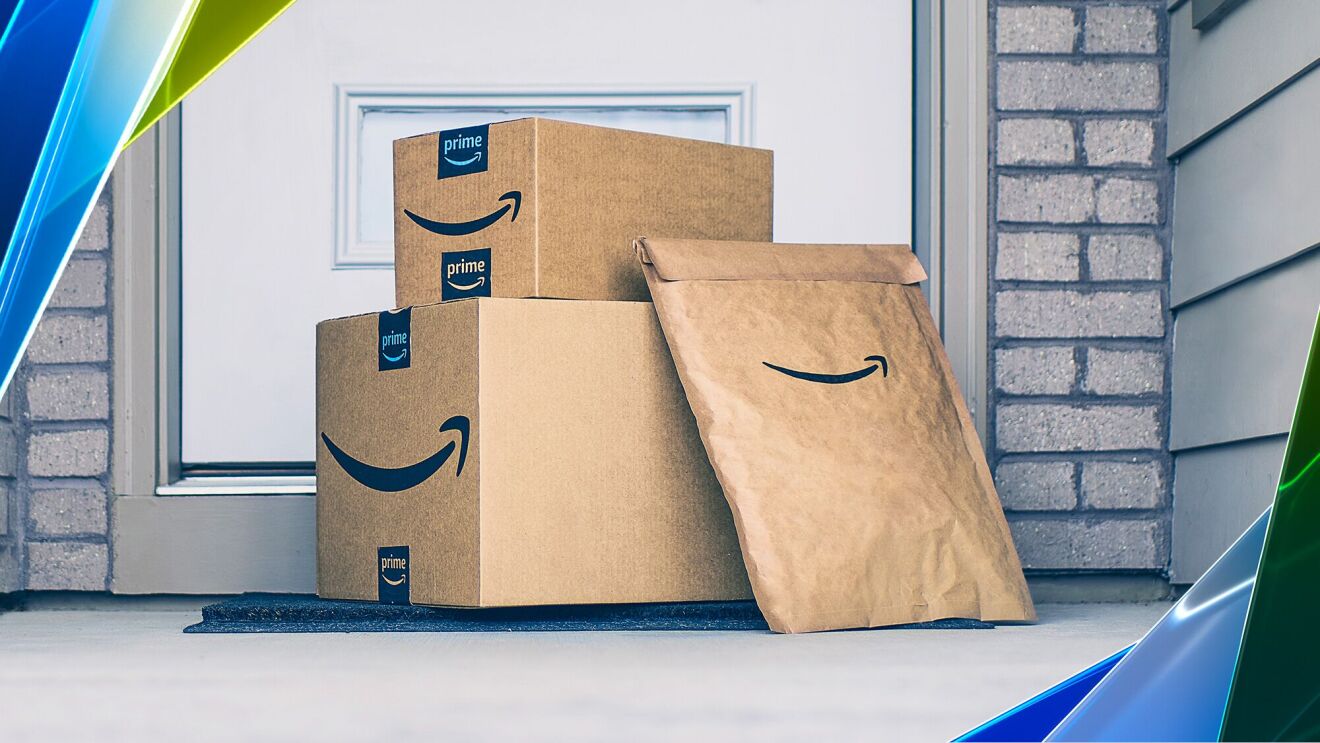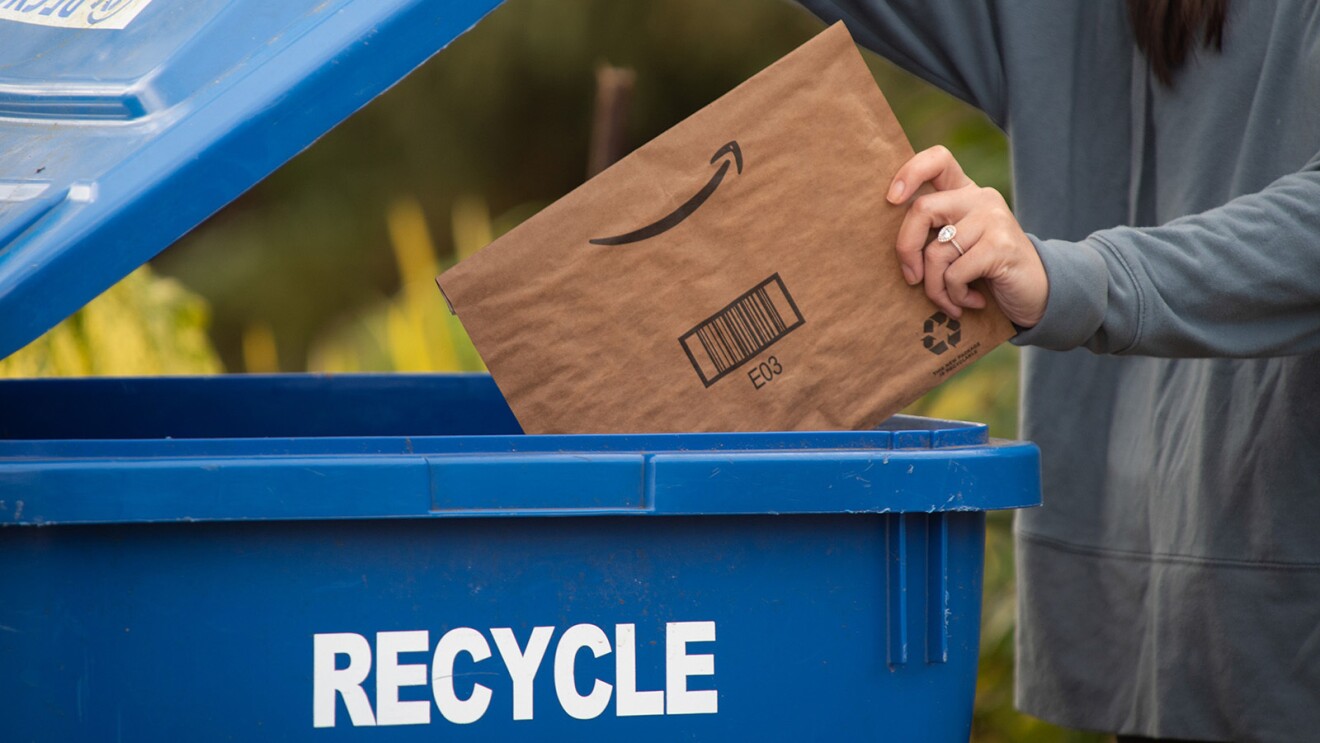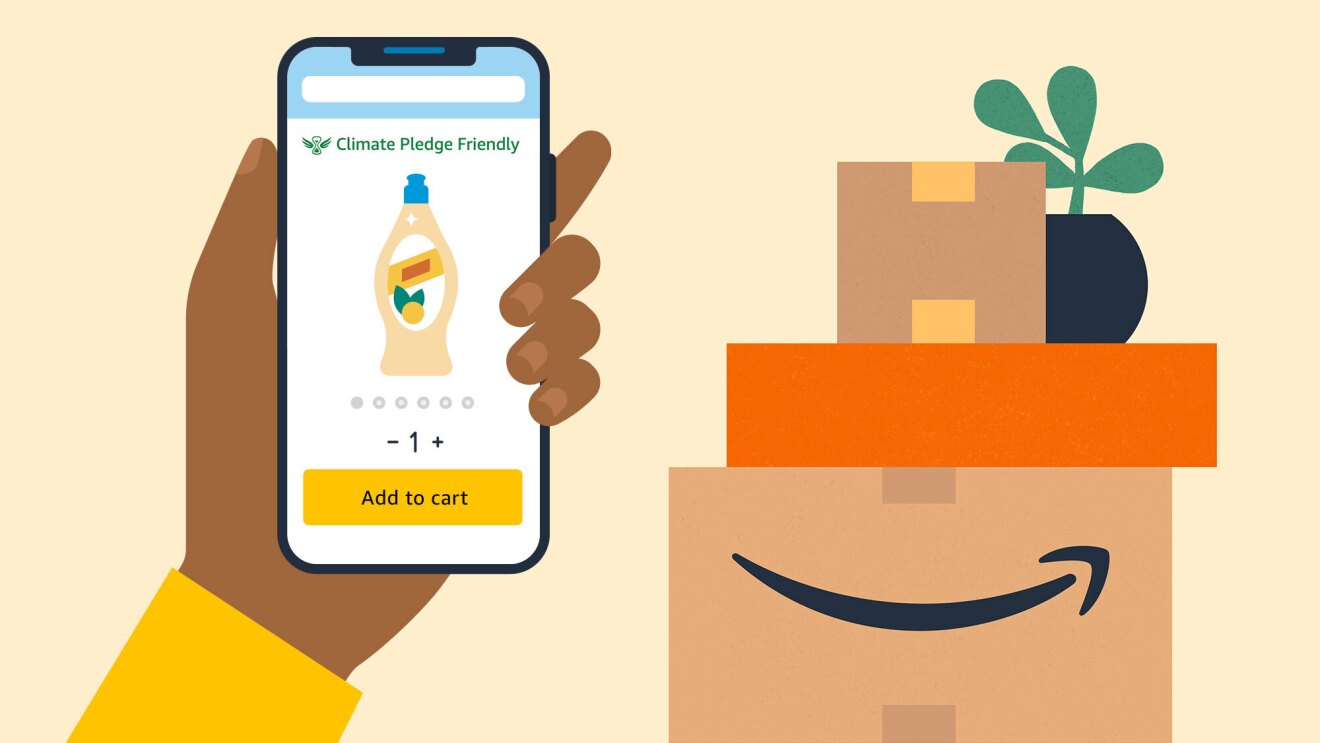Page overview
Driving the technology behind product sustainability
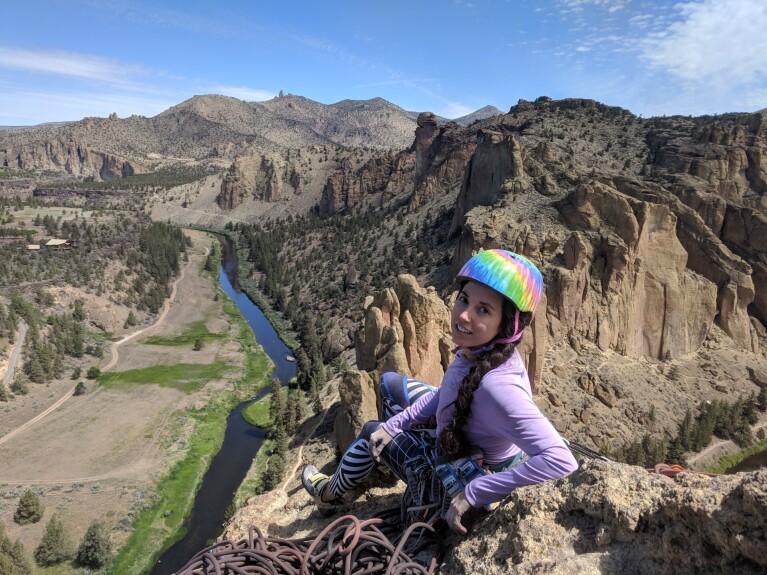
Marta Fraga, senior technology product manager for Amazon Product Sustainability.
Sustainability certifications are used by businesses around the world to help customers make informed decisions when shopping online. Amazon partners with trusted third-party certifiers and created its own certification, Compact by Design, to highlight products that meet sustainability standards through the Climate Pledge Friendly program.
Until recently, however, there was no centralized database capable of capturing individual products with sustainability certifications in a consolidated way. It’s a problem Fraga and her team have been determined to solve, and over the past two years, they’ve made significant strides.
Customers—especially younger generations—are very aware that sustainability is critical and that we only have one planet.
Marta Fraga
Senior technology product manager for Amazon Product SustainabilityAs a senior product manager of technology on Amazon’s Product Sustainability team, Fraga is responsible for managing the innovative technology that ingests unique product information from external certifiers and matches certified products with items that exist in Amazon’s store. Products that have gone through this process and are verified to have a sustainability certification are then marked with the Climate Pledge Friendly label, making them easier for customers to find.
“When you go to the grocery store and grab a product off the shelf, that product has a unique identification number that is different from if you were to select another color, scent, or flavor,” Fraga said. “The same is true for products on Amazon and those that sustainability certifiers work with. We want certifiers to focus on what they’re good at, which is setting standards and verifying products that have reduced environmental impacts—not spend their limited resources wading through data like this. We should be taking on that burden for them, and that’s exactly what we’re trying to do.”
As a longtime Amazon employee, Fraga realized early in her career that she enjoyed finding and fixing problems. She joined the company in 2011 as an intern on the small team that launched Amazon in Spain. After graduating from university, Fraga accepted a full-time position as a marketing manager on the Amazon Devices team and spent the next several years leading initiatives to streamline marketing efforts across Europe. In 2014, she moved to the U.S. and started a position with Devices Supply Chain Operations, where she contributed to launching several milestone products, like the first-ever Fire TV Stick.
“As I was developing my career, I was also developing as a person,” Fraga said. “I think a lot of us who work in sustainability have this moment when we realize we have an impact with the choices we make, both at work and in our personal lives. I started getting intrigued about sustainability, and that inspired me to find areas within my role where I could make an impact not just in revenue, but on the environment. Eventually, I realized that to feel successful and fulfilled, I needed to be working in sustainability.”
Fraga joined the Product Sustainability team just after the launch of Climate Pledge Friendly in 2020. Since then, the program has grown from offering 75,000 products with sustainability certifications to offering more than 250,000 products. As the program continues to scale, Amazon has made a conscious effort to work with certifiers and brands of all sizes to ensure inclusivity and to promote visibility for small businesses.
“It’s been exciting to hear certifiers say they have a backlog of requests from more brands wanting to be certified, and from brands who have been certified and accepted into our program, hearing how the Climate Pledge Friendly label has brought more awareness to their products,” Fraga said.
Looking ahead, Fraga is excited to continue driving the technology improvements needed to support product sustainability. This work includes finding scalable ways to identify products that are more sustainable on Amazon and beyond.
“Customers—especially younger generations—are very aware that sustainability is critical and that we only have one planet,” Fraga said. “Amazon is committed to sustainability and we want to encourage our customers, as well as other companies, to join us in this journey by making decisions that are more sustainable. We know we’re in a prime spot to inspire change, and we still have work to do, but we’re making a lot of progress. I’m proud to be part of that.”
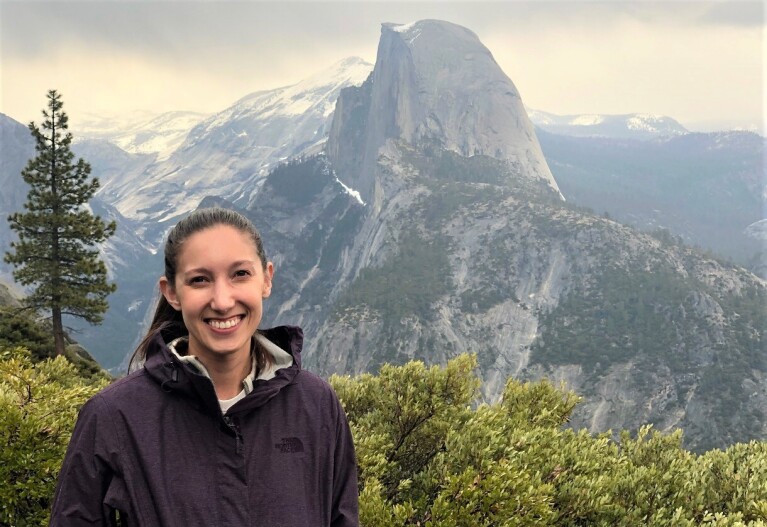
Caitlin Enomoto, senior sustainability operational excellence lead for Amazon Devices Sustainability.
We’re working hard to make our devices more sustainable—from how we build them to how customers use them. For Enomoto, identifying materials that have reduced impacts on the environment is her full-time job.
With an education in mechanical engineering and experience working at smaller startups before joining Amazon, Enomoto has always been fascinated by solving ambiguous problems through collaboration. She also strives to consider sustainability in all aspects of her life and was looking for a way to blend more of her personal interests into her career.
“Sustainability is something I’ve always been passionate about, and it was really exciting to me that Amazon was investing in this as a business,” Enomoto said. “Working on sustainable materials was a chance for me to really merge all of the things I cared about.”
Enomoto joined Amazon in 2016 as a product design engineer on the Amazon Devices Accessories team. She soon helped launch an internal affinity group for women at Amazon working in the San Francisco Bay Area, which provided a platform for employees to hold conversations around diversity, equity, and inclusion (DEI). Inspired by this newfound network, she transitioned to a program management role driving DEI initiatives for employees inside and outside of Amazon Devices. Then, in 2020, she joined the Amazon Devices Sustainability team, where she was tasked with finding, testing, and integrating materials proven to be more sustainable across all devices.
It’s the right thing to do, not only for our customers, but for the environment and world we all share.
Caitlin Enomoto
Senior sustainability operational excellence lead for Amazon Devices SustainabilityBefore she could get to work, Enomoto had to grapple with a question that’s much easier asked than answered: How does Amazon define a sustainable material?
“There are so many different definitions people can take away from that,” Enomoto said. "It's important to our customers that what’s going into their products is recycled. That means those materials had a previous life in some other product, which contributes to reducing waste.”
For Enomoto and her team, the ultimate goal was to identify a set of materials that could reduce carbon impacts. They knew that recyclability and waste elimination were two big ways to decrease the amount of carbon involved in device manufacturing. After extensive research—which involved partnering with materials scientists both inside and outside of Amazon—aluminum stood out as a strong option for testing.
“As we learned more about the materials themselves, one thing I found interesting is how recycling actually affects them,” Enomoto said. “Aluminum is endlessly recyclable—it can be recycled over and over without losing any of its mechanical properties. Therefore, using recycled aluminum can be super impactful because it avoids a lot of the processing involved in manufacturing something brand new. So, the carbon footprint for that recycled aluminum is drastically different than the virgin alternative. It might not be noticeable for consumers because it’s mainly on the inside of the devices, meaning they’re not seeing it. But it’s important for decreasing the impact of the overall device and supporting our path to decarbonization.”
As a result of her team’s findings, all Echo, Fire TV, Fire Tablet, Kindle, and Smart Home devices now include 80-100% recycled aluminum, along with 10-60% post-consumer recycled plastic, and 40-100% post-consumer recycled fabric, depending on the product. These advancements are in addition to Amazon’s investments in renewable energy projects, developments to make products more energy efficient, and efforts to source more-sustainable materials into the company’s packaging. Combined, these improvements put Amazon on track to cut the carbon intensity of Amazon Devices in half by 2025.
“Amazon has a big impact and the potential to challenge ourselves and others to do better,” Enomoto said. “Climate change is extremely urgent, and addressing it isn’t something we can do alone, but we can provide a platform to help people make informed choices. One way we’re doing that is by incorporating recycled materials into our devices. It’s the right thing to do, not only for our customers, but for the environment and world we all share.”
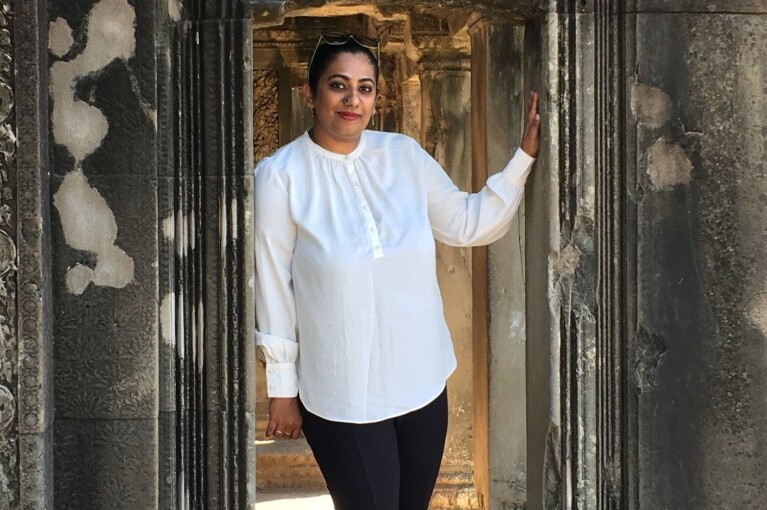
Gangamma, sustainability program manager for Amazon Social Responsibility.
Gangamma says there was a time when she wasn’t aware that she could pursue a career in social work. She now develops programs and relationships on behalf of Amazon’s Social Responsibility team to ensure fundamental human rights are embedded across Amazon’s global supply chain.
Growing up in India, Gangamma studied science and microbiology in college after her parents encouraged her to become a doctor. It wasn’t long before she realized science wasn’t her passion.
“I always knew it wasn’t what I wanted to do,” Gangamma said. “I did end up graduating with a science degree, and during that time, I was also a trained dancer. I met a lot of other dancers who were studying social work, and that’s when I realized I could actually turn this passion into a career.”
When Gangamma decided to pursue a master’s degree in social work, she remembers being hesitant to tell her parents. Thankfully, their reaction quickly reassured her.
“If you want to do it, just do it,” Gangamma recalls her mother saying. “She was the one who really stood by me and always told me that I should never stop studying.”
Gangamma also recognized that having access to ongoing education—as well as other resources like health care and professional development training—wasn’t always a reality for women in her country. She wanted to change this and found a way to do so by working for a nonprofit called Swasti. There, she learned about the challenges women face in the workplace and what global brands were doing to encourage gender equity in their supply chains. She began working with companies to develop women’s empowerment programming and to build her network.
I think social responsibility is the key between people and community.
Gangamma
Sustainability program manager for Amazon Social ResponsibilityIn 2020, Gangamma brought her skillset to the Amazon Social Responsibility team.
“They valued my subject matter expertise and unique perspective,” Gangamma said. “They trusted that I had the knowledge, and I’ve always enjoyed having the independence to work someplace where they believe in you. That was my expectation coming into Amazon, and that is exactly what happened.”
Since joining the Social Responsibility team, Gangamma has been driving change for gender equity across the factories that support Amazon’s Private Brands supply chain in the South Asia region. Through a partnership between Amazon, the BSR HERproject, and Swasti4WE, she’s led efforts to reach more than 20,000 women with training focused on health and financial skills. Both the BSR HERproject and Swasti4WE bring together global brands, their suppliers, and local partners to create and implement workplace-based interventions on health, financial inclusion, and gender equality.
When asked how gender equity and inclusion contribute to building a more sustainable business, Gangamma shared her personal definition:
“It’s a balance between people, planet, and community,” she said. “To me, you can’t truly be a sustainable brand unless you’re protecting all three points. There are different ways of achieving this, and I think social responsibility is the key between people and community. As a worldwide brand, Amazon is a leader in the sustainability industry, and when we take steps to think about sustainability beyond the environment, we hope others will follow.”
Note: Ganagamma prefers to use her first name only for the purposes of sharing her story.

Alyssa Boggs, external engagement and partnerships strategy lead for Worldwide Sustainability.
Boggs was on a flight headed to a business meeting when she received the news that became the proudest moment of her professional career (so far). Amazon CEO Andy Jassy had signed the United Nations Women’s Empowerment Principles (WEPs), and Amazon would also be donating $1 million to the Resilience Fund for Women in Global Value Chains.
At the time, Boggs was a senior strategic partnership manager on Amazon’s Social Responsibility team, working directly with organizations focused on inclusivity and women’s empowerment in the workplace. As part of her work, she advocated for Amazon to demonstrate its continued commitment to gender equity by signing the WEPs.
Supported by more than 5,000 corporate signatories, the WEPs were established by the United Nations Global Compact and UN Women to offer businesses guidance on ways to promote gender equity and to empower women in the workplace and global community.
I’ve really been able to see that when you lift up women, you lift up communities.
Alyssa Boggs
External engagement and partnerships strategy lead for Worldwide Sustainability at AmazonAdvancing gender equity is an important part of Amazon’s work to strengthen the resiliency and sustainability of its broader global value chain. It’s one of the company’s five Key Commitments for responsible sourcing; the other four are safe workplaces, freely chosen employment, fair wages, and environmental protection. It’s also important to Boggs, who has a master’s degree in peace studies and conflict resolution from the London School of Economics and Political Science.
“I was ecstatic when I found out—I couldn’t contain my excitement in the moment on that plane,” Boggs said. “I knew Amazon was already doing a lot of the work to advance women’s empowerment. It was important to me that we made our commitment clear to our customers and stakeholders by supporting the WEPs. I also knew that joining the WEPs would allow us to learn from other signatories. We can’t solve everything on our own, and we’re more impactful when we collaborate with others.”
Long before the WEPs were signed, Boggs was already applying the purpose behind them to her work. She started her career with Amazon in 2015 and previously spent a number of years working for nonprofits including WorldVision and the Gates Foundation. Those experiences inspired her to look for opportunities at Amazon where she could drive change for underserved communities.
In 2016, Boggs transitioned to Amazon’s Social Responsibility team within the Worldwide Sustainability organization where she focused on building external partnerships that prioritized conducting business responsibly. Her work included building a collaboration with Nest, a nonprofit supporting the responsible growth and creative engagement of the global handworker economy. Boggs saw an opportunity to introduce representatives from Nest to Amazon Handmade, which strives to empower local artisans and connect them to customers around the world. As a result, Amazon Handmade and Nest announced a partnership in September 2021 to provide more than 250,000 artisans worldwide—the large majority being women—with the support and technology to reach Amazon’s millions of customers and grow their small businesses in the process.
“Through my professional work and my educational background, I’ve really been able to see that when you lift up women, you lift up communities,” said Boggs. “For me, it really all comes down to humans supporting other humans.”

Melanie LeGrande, rights and equity lead for Amazon Web Services (AWS) Global Social Impact.
Each year, an estimated 25 million people are trafficked worldwide. It’s a global public health issue that has become even more prevalent during the COVID-19 pandemic, as criminals look to capitalize on the amount of time both adults and children are spending online.
To address this growing problem, institutions around the world are developing tools to defend people of all ages from online predators. Several nonprofits confronting human trafficking rely on AWS to power their technology, and when these customers need additional support to amplify their work, they turn to the AWS Global Social Impact team.
If technology is an enabler of this issue, then technology should be utilized to fight it.
Melanie LeGrande
Rights and equity lead for AWS Global Social Impact“It’s important for me to make a difference in the lives of individuals and communities that need our help,” said LeGrande. “Advancing human rights and safeguarding protections for vulnerable populations is integral to Amazon’s commitment to corporate social responsibility, and confronting human trafficking is a big focus of my work. It’s rewarding for me to support those on the forefront of this issue and help them accelerate their cloud-first technology strategies.”
Before joining Amazon in 2021, LeGrande spent 17 years focused on social impact through various institutions including Major League Baseball, the National Football League’s Baltimore Ravens, and the Silicon Valley Community Foundation. The recurring theme of her work no matter the employer, she said, has always been: “How can I best leverage my company’s assets to positively impact people in our society?”
She’s carried that mentality into her role with AWS, supporting nonprofits like Polaris and The Lantern Project. For both organizations, AWS provides services that enable their systems to be more efficient, and LeGrande identifies opportunities to bring broader awareness to their work through speaking engagements, employee engagement, and marketing efforts.
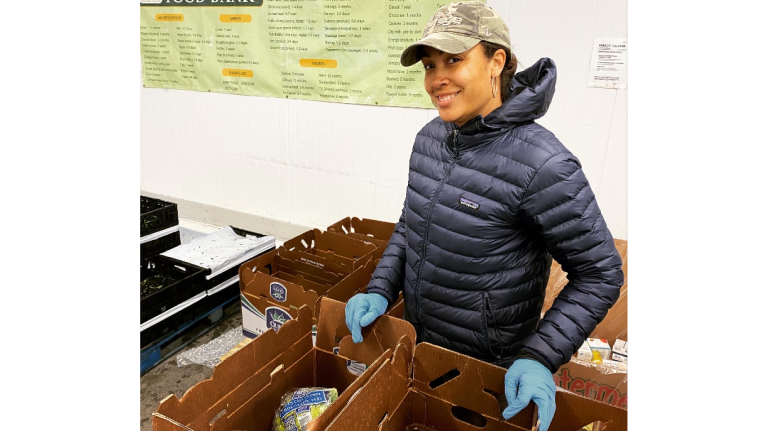
“My job is to listen to our customers, understand their goals and operational challenges, and work with them to deliver on their ambitious missions to change the world,” LeGrande said.
Polaris runs the U.S. National Human Trafficking Hotline to help victims and survivors of the illegal $150 billion industry. Through the hotline, Polaris has handled more than 330,000 signals—including calls, texts, online chats, webforms, and emails—and identified more than 73,000 situations of human trafficking since 2007. AWS works with Polaris to infuse cutting-edge technology into its infrastructure and drive the organization's development of the largest known U.S. data set on trafficking. Polaris then uses that data to improve the way trafficking is identified by law enforcement and others, how service providers assist victims and survivors, and how communities, businesses, and governments can prevent it by transforming the underlying inequities and oppressions that make it possible.
Similarly, The Lantern Project works to end trafficking exploitation across communities by changing culture through prevention, intervention, and transformation. The organization is also part of the Tech Against Trafficking Accelerator program, an initiative that connects Tech Against Trafficking’s member companies (including Amazon) to expedite technological advancements that will help eradicate human trafficking.
To LeGrande, Amazon’s ability to collaborate with others in the fight against human trafficking is not only the right thing to do, it’s a responsibility.
“Studies have shown that technology has enabled trafficking to grow as a criminal enterprise,” she said. “AWS has the resources, expertise, and infrastructure to help bring an end to human trafficking worldwide. We should be working with anyone and everyone we can to provide the best available solutions. If technology is an enabler of this issue, then technology should be utilized to fight it.”
If you or someone you know may be a victim of human trafficking or has a tip about a potential case of human trafficking, contact the U.S. National Human Trafficking Hotline by calling 1-888-373-7888 (TTY:711) or texting “BeFree” (233733). Help is also available via live chat.
Trending news and stories




